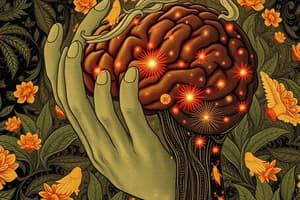Podcast
Questions and Answers
What does the Trace Decay Theory suggest about forgetting?
What does the Trace Decay Theory suggest about forgetting?
- Memory traces are unaffected by time and experience.
- Memory traces improve over time with use.
- Memory traces vanish instantly after learning.
- Memory traces fade over time if not used. (correct)
Which technique is NOT a method to enhance memory?
Which technique is NOT a method to enhance memory?
- Proactive Interference (correct)
- Keyword Method
- Chunking
- Method of Loci
According to Ebbinghaus's forgetting curve, when does the rate of forgetting occur the fastest?
According to Ebbinghaus's forgetting curve, when does the rate of forgetting occur the fastest?
- After two days
- After one week
- Within the first hour (correct)
- After 24 hours
What is retroactive interference?
What is retroactive interference?
Which of the following memory techniques involves associating new information with known language?
Which of the following memory techniques involves associating new information with known language?
What does the PQRST Method stand for in enhancing memory?
What does the PQRST Method stand for in enhancing memory?
What is the origin of the term 'memory'?
What is the origin of the term 'memory'?
Which memory process involves converting sensory information into a form that can be registered?
Which memory process involves converting sensory information into a form that can be registered?
What is a characteristic of short-term memory (STM)?
What is a characteristic of short-term memory (STM)?
What type of memory is primarily involved in performing tasks without conscious effort?
What type of memory is primarily involved in performing tasks without conscious effort?
Which method is typically used for converting incoming information into permanent records?
Which method is typically used for converting incoming information into permanent records?
In the Atkinson and Shiffrin model of memory, which type of memory has a very short duration?
In the Atkinson and Shiffrin model of memory, which type of memory has a very short duration?
Which of the following best describes elaborative rehearsal?
Which of the following best describes elaborative rehearsal?
What is the main function of memory in the context of social and emotional experiences?
What is the main function of memory in the context of social and emotional experiences?
Flashcards are hidden until you start studying
Study Notes
Nature of Memory
- The term "memory" derives from Latin words ‘memoria’ (mindful) and ‘memor’ (remembering).
- Memory enables the maintenance of information over time and the use of past experiences in present situations.
- It provides continuity for consciousness and assists in dealing with current situations through essential skills.
- Enhances social and emotional experiences via effective planning and performance.
Memory Processes
-
Encoding (Registration):
- Transforms sensory information into a memory-compatible format.
- Involves receiving, processing, and combining information, such as turning song lyrics into a storable format.
-
Storage (Retention):
- Converts information into permanent records using methods like maintenance rehearsal (repetition) and elaborative rehearsal (understanding).
- For example, lyrics stored through repetition or meaningful associations.
-
Retrieval (Recall or Recognition):
- Accesses and brings stored information into consciousness when required, such as recalling and singing a song.
Models of Memory
-
Atkinson and Shiffrin Model (Information Processing Model):
- Analyses human memory like a computer system, encompassing three stages: Sensory Memory, Short-term Memory, and Long-term Memory.
-
Sensory Memory:
- Characterized by large capacity and very short duration (less than a second).
-
Short-term Memory (STM):
- Holds limited information for under 30 seconds; requires rehearsal for transfer to long-term memory.
-
Long-term Memory (LTM):
- Has a vast capacity for permanent information storage through elaborative rehearsal.
Types of Memory
-
Implicit Memory (Unconscious/Automatic):
- Engages in tasks without conscious effort, such as procedural memory for motor skills (e.g., riding a bicycle).
-
Explicit Memory (Declarative):
-
Requires conscious recall of experiences and information.
-
Episodic Memory: Stores personal experiences and events (e.g., remembering a birthday).
-
Semantic Memory: Contains general knowledge (e.g., facts and concepts).
-
Forgetting
-
Hermann Ebbinghaus:
- Pioneered the systematic study of forgetting, creating the forgetting curve which shows rapid memory loss within the first hour of learning, particularly within the first nine hours.
-
Causes of Forgetting:
-
Trace Decay Theory: Suggests that memory traces fade over time if not frequently used.
-
Interference Theory:
-
Proactive Interference: Old information disrupts the recall of new information.
-
Retroactive Interference: New information hinders the recall of old information.
-
-
Techniques for Enhancing Memory
- Keyword Method: Links new information with similar-sounding words from a known language.
- Method of Loci: Visualizes items to remember as objects within a familiar physical space.
- Mnemonics using Organization: Structures material to improve retrieval ease.
- Chunking: Groups smaller units into larger, manageable chunks.
- Minimizing Interference: Advises against learning similar subjects back-to-back and encourages breaks.
- Use of Retrieval Cues: Connects elements of study material to specific cues for easier recall.
- PQRST Method: Involves Previewing, Questioning, Reading, Self-recitation, and Testing to enhance understanding and retention.
Studying That Suits You
Use AI to generate personalized quizzes and flashcards to suit your learning preferences.




